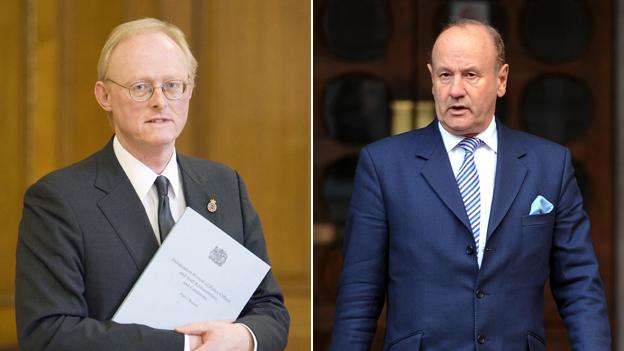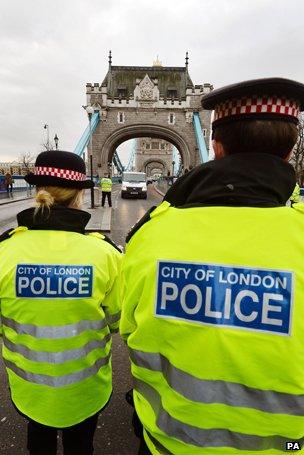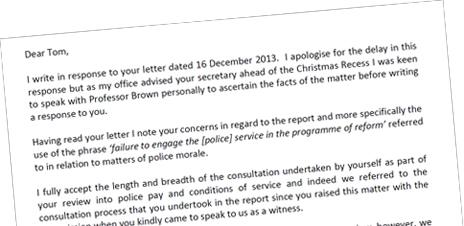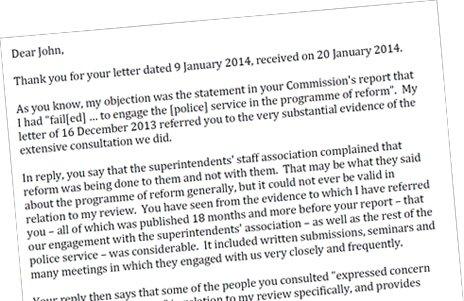Bust-up between police reviewers goes public
- Published
- comments

Tom Winsor (left) and Lord Stevens
Letters obtained by the BBC reveal an astonishing row between the two men asked to conduct independent reviews of the police - one by the government and the other by the opposition.
In the blue corner, Tom Winsor, now HM chief inspector of constabulary, who was asked to review police pay and conditions in England and Wales by the Home Office in 2010.
In the red corner - Lord Stevens of Kirkwhelpington, a former Metropolitan Police commissioner and crossbench peer, who was asked to head an independent commission on policing by the Labour party last year.
In a letter to Lord Stevens obtained under the Freedom of Information Act, Mr Winsor records his dismay at parts of the peer's report, which he describes as "beyond rational comprehension" and "plainly unsustainable".
The reply from Lord Stevens quotes a series of often personal criticisms of Mr Winsor from police officers. One claims "Winsor was not independent" and that his review was "politically driven".
The personal feud reflects a deeper clash between police officers who resent a civilian having such a central role in their future, and Conservative politicians who think it is best for an outsider to push through necessary reform and scrutiny.

The row began when Lord Stevens published his review of policing last November and criticised Mr Winsor for a "failure to engage" properly with serving police officers before announcing his controversial reform proposals.
The report described the Home Office-commissioned Winsor review as "a damaging process" and said the reforms had "not been accompanied by adequate discussion or engagement with those most affected."
The Labour party-commissioned Stevens' report also appeared to hint that the government's review had been politically motivated, saying the reform package "needs to be subject to independent review in due course".
Tom Winsor was furious and demanded Lord Stevens withdraw any suggestion that he had failed adequately to consult.
"This is plainly unsustainable," Mr Winsor wrote in a letter dated 16 December, noting that he had already told Lord Stevens about the "over 7,000 submissions from police officers and others" as well as written and oral evidence obtained by his review.
"How this can be described as a failure to engage the police service is beyond rational comprehension," the letter continues. "I was further dismayed to see that, notwithstanding my clear explanation to you of how extensively we did engage with the police service in the review, you repeated the criticism without amendment in your oral presentation of the report."
In an angry conclusion to his letter, Mr Winsor writes "the failure of any communication to me on the subject when one was promised, does no credit to the Commission."

Excerpt from Lord Stevens' letter to Tom Winsor, 9 January
A reply from Lord Stevens, dated 9 January, apologises for the delay in responding but repeats the central criticism: "The Government's programme of reforms, of which your review was a key element, collectively failed to engage with grass roots members of the Service and key partners."
Lord Stevens suggests the process had "contributed to the fall in police morale" and then quotes comments from police officers who had contacted his commission.
"PLEASE STOP TOM WINSOR FROM TAKING AWAY ALLOWANCES AND EXTRA PAY FROM HARD WORKING POLICE STAFF. Start listening to the people doing the Job!!!," says one.
"It seems to me and a great deal of my colleagues that Winsor was not interested in what any rank and file officer had to say!!!!!!!!!!!!" says another.
A third questions the objectivity of the process: "We are being treated like chattels with changes to pay and conditions without independent review. (Winsor was not independent). Policing in the UK needs a Royal Commission, not a politically driven review."
Lord Stevens' letter also suggests Mr Winsor ignored evidence from the Police Federation, the organisation representing rank and file officers.
"The Federation had a plan of their own that they were keen to share with you whch [sic] they claimed would have saved the police service money but which you took no notice of," Lord Stevens writes. "I am not claiming this to be the truth when there is such disparity in the accounts bu [sic] it is something the Commission could not ignore."
The spat reflects police hostility to the idea of the home secretary appointing a non-police officer to review their pay and conditions, anger heightened by Tom Winsor's subsequent appointment as chief inspector of constabulary in 2012.
The home affairs select committee said it had received "nearly 100 representations from individual police officers expressing concern" at his nomination for the chief inspector role. Sir Hugh Orde, President of the Association of Chief Police Officers, told them "the appointment of a non-police officer" signalled a step-change from tradition.
The Police Superintendents' Association and Police Federation also expressed their opposition to the idea of a civilian being appointed as the boss of HM Inspectorate of Constabulary.
The late Paul McKeever, then chairman of the Police Federation, said his members struggled to comprehend "how anyone who has not worked extensively within the police service" could have the necessary understanding for the role.
The home secretary, by contrast, has shown great loyalty to Mr Winsor, evidenced by the fact that in December the HMIC was given a £9.4m increase to its budget - money top-sliced from the police budget. Some senior officers have interpreted the move as a deliberate snub to the service and a pat on the back for Mr Winsor.
In a further move, Mr Winsor has written again to Lord Stevens this morning, clearly still fuming. Responding to the suggestion that he failed to take any notice of a Police Federation money-saving proposal during his review, Mr Winsor asks why no-one had asked him about the matter.

Excerpt from Tom Winsor's letter dated 14 February
"The rules of natural justice - and basic fairness and courtesy - require that such material matters are put to the person who is the object of the criticism for his or her response," Mr Winsor writes. "I cannot understand how the Commission could have thought accepting these criticisms in this was fair or responsible."
Lord Stevens has said that a colleague on his commission, Professor Jennifer Brown, had emailed Mr Winsor's office on two occasions prior to the launch of his report "without receiving any response". Mr Winsor has responded saying there is no "record or recollection of any attempt on the part of Professor Brown to communicate" during the period in question.